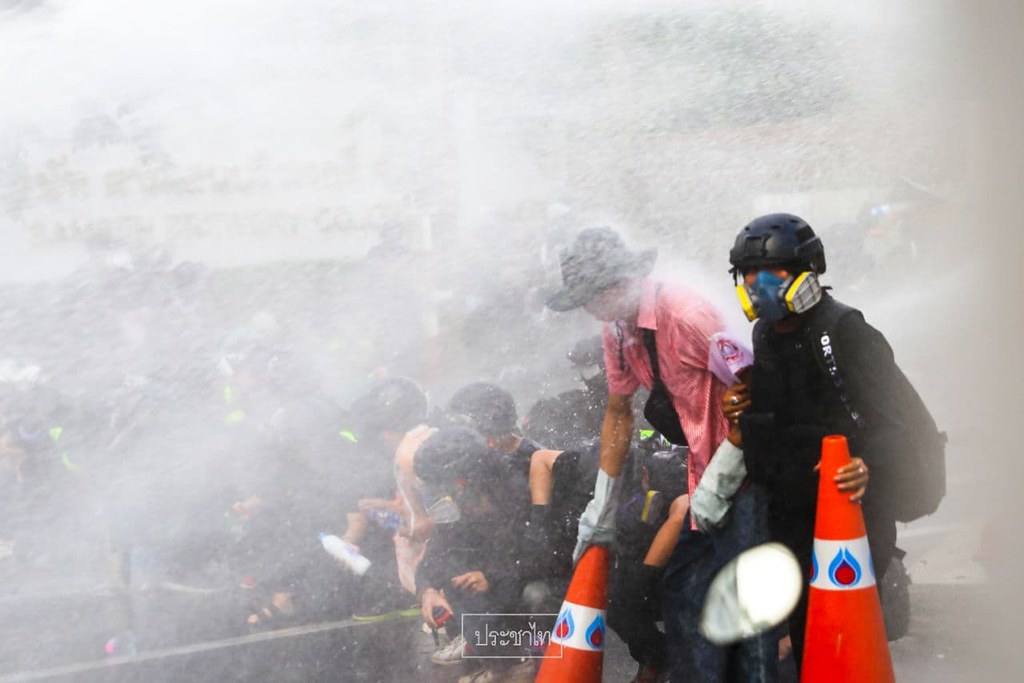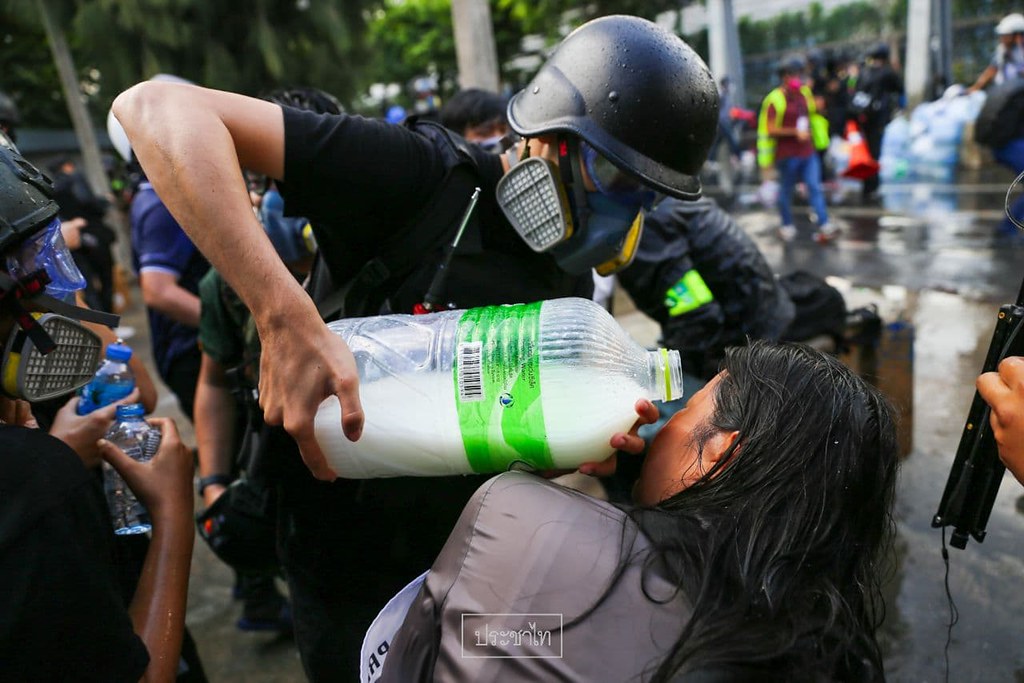Protesters gathering on the streets in front of the parliament building to demand constitutional amendments on 17 November were met with blockades and riot police, as well as water cannon and tear gas.

A protester at the Bangkrabue intersection barricade flashing the three-finger 'Hunger Games' salute as tear gas smoke loomed ahead.
Police water cannon began firing at protesters at around 14.00, an hour before the scheduled start time of the protest as announced by the student activist group Free Youth. The police reportedly warned protesters beforehand that they would fire a warning shot, and made an announcement while they were counting down that they had mixed a chemical irritant into the water.
At 16.00, on Samsen Road, in front of the Boon Rawd Brewery Co, Ltd, the police fired water cannon and tear gas at the protesters again, while protesters at the Kiak Kai Intersection brought in the giant inflatable ducks, nicknamed “the navy” and previously intended as a mockery of the government, to be used as shields against the water cannon.

Riot police blocking Samsen Road behind a barricade of concrete blocks and razor wire
At 19.44, after almost 6 hours of struggle, during which the police continuously fired water cannon and tear gas at protesters at both the Bang Krabue and Kiak Kai intersections, protesters broke through the police barricade at the Bang Krabue intersection, while protesters have already broken through at the Kiak Kai intersection.
At 20.50, the protesters arrived in front of the parliament building, while police retreated inside the parliament compound.

Protesters were continuously hit with water cannons during the 6 hours of struggle to break through police blockade
There were reports of more than 10 waves of tear gas being used on protesters both in canister form and from the water cannon. Thairath also reported that gunshots and explosions were heard during a clash between pro-monarchy protesters in yellow and the pro-democracy guards.
Folk, a young monk, faced several tear gas salvoes on the front line at Bang Krabue intersection. He said that he and like-minded monks had formed the ‘New Religion Reform Group’.
The group calls for real separation of the state and religion and an end to the involvement of religion in economic gain. He was not afraid of the threat from the Sangha Supreme Council of Thailand, the national supreme ruling body of the monkhood, which condemned monks’ participation in protests. Folk said that the threat was not based on any original regulation governing monks.

Protesters were also using sitting mats to defend themselves against the water cannon blasts
Former human rights commissioner Angkhana Neelapaijit was at the protest site. She said that she was supposed to attend a subcommittee meeting, but could not get to the parliament building because of the blockade set up by the authorities, and that she was also hit by tear gas.
Angkhana said that there was no violence from the protesters, but the authorities used tear gas anyway, and the police even told the protesters they were going to use rubber bullets, which does not comply with international human rights principles.
Former Pheu Thai MP Tossaporn Serirak was also at the protest. He said that he has been helping protesters who were hit with tear gas and water cannon, and that he was hit with both himself. He said that what the authorities have done is highly inappropriate.
As for the discussion taking place at the time in parliament, Tossaporn said he finds it unnecessary, as there have been previous attempts to stall the process from both the senate and government MPs, and that the voting is going to show how sincere they are toward the people.

The inflatable rubber ducks brought in by protesters at the Kiak Kai intersection barricade were later used as shields against water cannon blasts.
The protest took place at the same time as a special parliamentary session scheduled for 17-18 November during which senators and members of parliament discussed 7 proposals for constitutional amendments.
Chiranuch Premchaiporn, former Prachatai director and now part of the team which proposed the so-called “people’s draft” of constitutional amendments, spoke during the parliamentary session as a representative of the drafters. She called for an investigation into the use of force against unarmed protesters, who she said were there to follow up on the result of something they hoped for but who were instead met with violence.

Protesters were seen using either milk or water mixed with antacid to wash their faces after getting hit with tear gas.
Earlier in the day, there was also a demonstration by a crowd in yellow shirts, who opposed the draft of the constitutional amendments proposed by iLaw, as well as another demonstration by the Thai Phakdi group.
The protest ended at around 21.00. According to the Erawan Emergency Medical Centre, 55 people were injured during the protest, with five people being treated for gunshot wounds.
What was going on in parliament?

From left: Chiranuch Premchaiporn, Jon Ungphakorn, and Yingcheep Atchanont, as they wait to speak before parliament on 17 November as representatives of the drafters for the iLaw constitutional amendment draft, now known as the "people's draft." (Picture from iLaw)
Parliament discussed 7 draft constitutional amendments, 1 from the government coalition, 5 from the opposition coalition and 1 proposed by iLaw, a legal watchdog NGO, endorsed by 98,041 voters.
None of the drafts were passed on 17 Nov.
Among all the drafts, the iLaw version is the most detailed. Its intention is to uproot the legacy of the military government since they overthrew the government in 2014.
Here is a brief summary of the 7 drafts:
- The government coalition draft amends Section 256 to allow a constitutional drafting committee consisting of 200 members; 150 members to be elected and the other 50 to be appointed from a group of legal experts, academic experts, political experts and students.
- A draft from the opposition coalition excluding the Move Forward Party, also amends Section 256. It differs from the government coalition version in the selection of the drafting committee, which will be entirely elected and with provinces constituting electoral districts.
- The iLaw version establishes an all-elected constitutional drafting committee, using the whole country as an electoral district. It disqualifies senators, members of independent organizations and others appointed by the military government. It abolishes the provision allowing an unelected PM, the amnesty that the military government awarded to itself, the voting system where one ballot is counted for both constituency and party-list MPs, and the 20-year National Strategy.
- A draft from the opposition coalition giving voters 2 ballots, one for the constituency MP and one for the party list.
- A draft from the opposition coalition amending Section 159 and abolishing Section 272 to remove the authority of the appointed senate to participate in the vote for PM.
- A draft from the opposition coalition abolishing Sections 270 and 271 to remove the authority of senate to monitor and regulate the 20-year National Strategy.
- A draft from the opposition coalition abolishing Section 279 which legitimizes the military self-amnesty and all orders announced or endorsed by the junta leader, Gen Prayut Chan-o-cha.
The amendment process under the 2017 constitution is more difficult and complicated than in the 2007 and 1997 versions. In the past, a mere majority vote in parliament was needed, with no condition requiring approval by a minimum number of senators or opposition party MPs. Amendments are not restricted to any specific section. Changing the democratic regime of government with the King as Head of State or changing the form of the State is prohibited in all constitutions mentioned.
The proposed amendments will go through 3 readings
The first reading for the acceptance of principle shall be by roll call and open voting and must be supported by no less than half of the total number of members in both houses (375 votes), and no less than one third of senators.
The second reading considers the draft constitutional amendment section by section. Approval is by a majority of 376 votes from among both MPs and senators. If the draft under consideration is proposed by the people, the public is also free to express their opinions.
There will be an interval of 15 days before the third reading. Approval in the third reading requires the votes of more than half of the members of both houses combined, which is not less than 375 votes, including one-third of senators, and 20% of the combined MPs from all parties with no representatives among the President, Vice Presidents or Ministers.
After a successful third reading, there will be an interval of 15 days before the PM presents the draft of the constitutional amendment to the King for his signature. However, there will be a national referendum before this 15-day period if any of the following matters are amended:
- Chapter 1: General Provisions
- Chapter 2: The King
- Chapter 15: Amendment to the Constitution
- Any matter relating to the qualifications and prohibitions of persons holding positions under the Constitution
- Any matter relating to the duties or powers of the Court or any Independent Organization
- Any matter which renders the Court or any Independent Organization unable to act in accordance with its duties or powers.
Any amendment can be challenged in the Constitutional Court triggered by a petition by a group of MPs and Senators comprising 10% of the members of both houses. The Constitutional Court has 30 days to deliver its verdict.
Section 15 of the Constitution does not set any time limit for the King to sign any amendment which successfully passes parliament.
Any amendment therefore can be blocked by 2/3 of the military-appointed senate, or by a ruling of the Constitutional Court whose appointed members are approved by a secret vote of the Senate.

